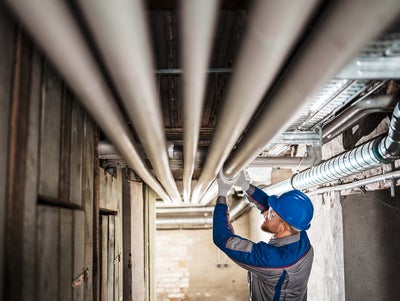
From audits to implementation, our suggested Energy Conservation Measures (ECMs) guarantee measurable savings and peace of mind regarding compliance with regulations - while aligning your operations with the UAE’s clean energy goals.
ista Middle East is one of the few companies in the UAE to be certified as both an Energy Services Company (ESCO) and a metering specialist. This unique combination enables us to provide comprehensive energy-saving solutions, including energy audits, identify most effective ECMs, installation, monitoring and performance-based savings. We guarantee proven results that reduce energy costs and carbon footprint, whether it’s AC upgrades, solar systems, pump optimisation, or LED retrofits.

Reduce your energy costs and meet your Energy Saving targets.
In a fast-growing economy like that of the UAE, improving energy efficiency is not just good practice, it is a regulatory and environmental imperative. This is where certified Energy Services Companies (ESCOs) play a critical role.
As a leading provider of smart metering and energy solutions in the UAE, ista Middle East holds a unique position as a certified ESCO and a utility service expert. This dual role enables us to deliver performance-based energy efficiency projects with measurable savings, while also ensuring the accuracy, transparency and compliance that only a metering specialist can provide.
An ESCO reduces a building’s energy consumption through technical upgrades and performance-based contracts. These upgrades, known as Energy Conservation Measures (ECMs), range from HVAC upgrades to lighting retrofits and pump optimisation. They are designed based on a detailed audit and implemented with guaranteed savings over time. The investment is often paid back through the savings generated, making energy efficiency financially and environmentally sustainable.
In order to coordinate this transformation on a large scale, the government of Dubai established Etihad ESCO, a government-backed “super ESCO”, which has been tasked with retrofitting 30,000 buildings by 2030. This initiative forms part of the emirate’s broader clean energy strategy, which targets significant reductions in electricity and water usage, as well as CO₂ emissions.
ista has been RSB-accredited since 2017 and is fully qualified to deliver ESCO services that meet local and international standards. With our integrated approach and full-cycle capabilities, we help clients unlock real savings while actively supporting the UAE’s energy transition.
End-to-end energy management is one of the core pillars of our UAE business at ista, and it goes far beyond audits and consultancy. We provide a comprehensive in-house service – covering everything from strategy and data to hardware installation and reporting.
It is this full-cycle approach that sets us apart. Unlike most ESCOs, who rely on third parties for metering and monitoring, ista combines energy performance contracting with decades of experience in smart metering, data analytics, and utility billing. This means our clients benefit from deeper insights, greater accuracy and smoother operations at every stage. The result? Buildings that are smarter, greener, and more cost-efficient.
With ista, you gain a trusted, ESCO-certified partner to manage every aspect of your building’s energy performance – efficiently, transparently, and in full alignment with the UAE’s clean energy vision. Our energy management services include:
Energy Performance Contracting (EPC) is a results-driven financing model that allows building owners to implement energy-saving upgrades without upfront investment. It begins with a detailed energy audit, where ista identifies opportunities to reduce consumption through measures like AC optimization, lighting retrofits, or pump upgrades. Once the Energy Conservation Measures (ECMs) are defined, the initial implementation costs are financed – typically through a green fund or financial institution. The key to the model is that the investment is repaid using the savings generated by the improvements themselves.
Throughout the contract period, ista guarantees the performance of the measures, continuously monitors energy consumption, and verifies that the projected savings are being achieved. After the repayment period, all savings go directly to the building owner, delivering long-term cost reductions and improved energy efficiency. This model significantly lowers financial risk while ensuring measurable, contractually secured outcomes.
Find your solution with us.
Always and everywhere informed.
We give houses a future.
By combining our one-stop solutions with the innovative technology in our appliances, managing your energy consumption has never been easier.

Get access to Government's green funds for your energy saving targets and trust an accredited and reliable partner to provide the solution from A to Z.
From inquiry to implementation – our mission is to create smart, one-stop solutions that make your life easier. We are here for our customers every step of the way and offer 24/7 customer support.
Our experts review your property's energy profile and recommend the best energy saving measures to reduce your carbon footprint and meet your targets.
Our advanced technologies have reduced energy consumption in a variety of buildings and environments and we have a track record in providing you these solutions from A to Z.
We take care of Operation & Maintenance of the equipment over the life cycle.
We measure and validate the guaranteed savings, which are verified by the independent Super ESCO.
A Super ESCO is a government-established entity that develops and manages the energy efficiency market by coordinating with private ESCOs. In Dubai, the official Super ESCO is Etihad Energy Services Company (Etihad ESCO), created by DEWA under the guidance of the Dubai Supreme Council of Energy (DSCE). Its role is not to compete with private ESCOs, but to oversee large-scale retrofit programs, set standards, and facilitate access to financing. Etihad ESCO leads the building retrofit initiative under Dubai’s Demand Side Management (DSM) strategy and ensures alignment with national energy efficiency goals.
As a certified and RSB-accredited ESCO, ista guarantees savings through Energy Performance Contracts (EPCs). These contracts are structured around detailed pre-project energy audits and savings calculations. We use international Measurement and Verification (M&V) protocols—such as the IPMVP (International Performance Measurement and Verification Protocol)—to track performance. The savings are contractually defined and monitored throughout the project duration to ensure the agreed results are achieved.
In the EPC model, the ESCO—such as ista—assumes the performance risk. If the guaranteed savings are not met, the ESCO is financially responsible for covering the shortfall, as outlined in the contract. This may involve compensation, technical adjustments, or extending the performance period. All savings are transparently verified using established Measurement and Verification (M&V) protocols throughout the project duration.
That’s why it’s essential to choose an experienced and accredited ESCO partner. With over 60 years of international expertise and a strong local presence in the UAE, ista offers both the technical capability and long-term reliability needed to deliver on performance guarantees with confidence.
The Dubai Green Fund (DGF) is a government-backed initiative that promotes investment in green and sustainable projects across the UAE. As the first specialised green investment fund in the MENA region, it supports Dubai’s long-term sustainability vision and clean energy strategies. The fund allocates up to AED 100 billion to support short- and long-term financing for green infrastructure and energy efficiency initiatives.
The DGF is not open to direct public applications from individual businesses or property owners. Instead, access to its financing is typically facilitated through strategic partnerships, particularly via Etihad Energy Services Company (Etihad ESCO)—Dubai’s government-established Super ESCO operating under the Dubai Electricity and Water Authority (DEWA).
Etihad ESCO collaborates with certified Energy Service Companies (ESCOs) to design and implement energy-saving projects in existing buildings. These ESCOs also work with financial institutions to structure performance-based funding models aligned with the DGF’s objectives.
Building owners or facility managers interested in accessing green financing should engage a certified ESCO—such as ista. The ESCO conducts a comprehensive energy audit, develops a savings proposal, and works with Etihad ESCO and affiliated financial partners to arrange the required financing. This enables clients to implement energy-saving measures without the need for upfront capital, with repayments typically covered by the guaranteed savings achieved over time.
The Dubai Integrated Energy Strategy 2030 (DIES) was launched in 2010 and deployed in 2011. It sets the strategic direction for Dubai’s long-term energy future by ensuring a secure, sustainable, and diversified supply of energy—while significantly improving demand efficiency across water, electricity, and transportation fuels.
The strategy is governed by the Dubai Supreme Council of Energy (DSCE), which is responsible for policy development, planning, and coordination with relevant authorities and energy stakeholders. The DSCE’s mission is to support Dubai’s economic growth through reliable energy supply and efficient usage—while protecting the environment and promoting long-term sustainability.
The strategy’s vision is clear: Dubai as a global role model for energy security and efficiency. Its goals include rationalizing energy use, ensuring environmental sustainability, diversifying energy sources, and optimizing governance across all DSCE-affiliated entities. A major part of the DIES is the Demand Side Management (DSM) strategy, which includes building retrofits, green building codes, and public-sector efficiency programs—all aimed at reducing energy and water consumption by 30% by 2030.
Launched in November 2015 by His Highness Sheikh Mohammed bin Rashid Al Maktoum, the Dubai Clean Energy Strategy 2050 sets out a bold vision: to produce 75% of Dubai’s energy needs from clean sources by 2050 and become a global hub for clean energy and the green economy.
The strategy is built on five strategic pillars:
Through this strategy, Dubai aims to become the city with the lowest carbon footprint in the world, setting a benchmark for sustainable urban development globally.
Our custom solutions are designed to help our clients reduce their environmental impact, improve health and safety in their buildings, and save energy costs.

Consolidate all your utility services into one streamlined billing system, simplifying payments and reducing administrative efforts for both property managers and end-users.

Transform your existing systems with our retrofit solutions, designed to improve efficiency, sustainability, and performance without the need for full system replacements.